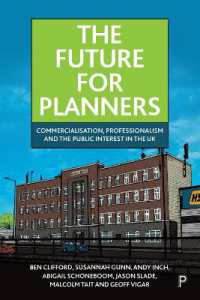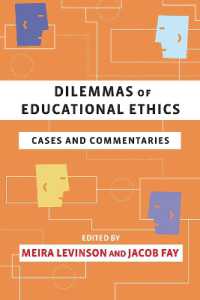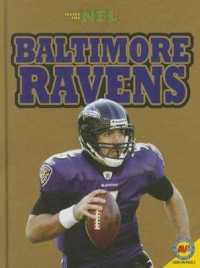Full Description
Early Reading First and Beyond helps preschool teachers, literacy coaches, and administrators understand and implement Early Reading First legislative initiatives and enhance the early language and emergent literacy skills of preschool children. The first chapter explains Early Reading First initiatives and current legislation from the U.S. Department of Education and No Child Left Behind. Subsequent chapters provide detailed explanations on each of the essential domains of early literacy development. The text summarizes current research and shows educators how to promote early literacy and pre-reading skills and how to create preschool programs of excellence. The author discusses the key elements of Early Reading First: - Partnering with parents- Designing preschool educational programs of excellence- Oral language development- Phonological awareness- Print awareness- Alphabetic knowledge- Developing early metacognitive thinking
Contents
PrefaceAcknowledgmentsAbout the Author1. Introduction to Early Reading FirstResearch That Early Childhood Teachers Can Use About Early Reading FirstSummary2. Oral Language Development: Emerging Vocabulary, Expressive Language, and Listening ComprehensionWhy Teach Oral Language to Preschool-age Children?Research That Early Childhood Teachers Need to Know About Oral Language DevelopmentNew Research-Based Practices Early Childhood Teachers Can UseEarly Reading First Assessment Tools for Oral Language DevelopmentDifferentiating for Early Learners With Individual NeedsTeaching Tips That Increase Home-School ConnectionsLiteracy Treasure ChestSummary3. Alphabetic KnowledgeResearch That Early Childhood Teachers Need to Know About Alphabetic KnowledgeNew Research-Based Practices That Early Childhood Teachers Can UseEarly Reading First Assessment Tools for Knowledge of Alphabetic PrincipleDifferentiating for Early Learners with Individual NeedsLiteracy Treasure ChestSummary4. Phonological Awareness: Giving Early Learners an Advantage When Learning to Read, by Kathryn BausermanResearch That Early Childhood Teachers Need to Know About Phonological AwarenessNew Research-Based Practices That Early Childhood Teachers Can UseEarly Reading First Assessment Tools for Phonemic AwarenessDifferentiating for Early Learners With Individual NeedsTeaching Tips That Increase Home-School ConnectionsLiteracy Treasure ChestSummary5. Print Awareness, by Cynthia A. LassondeResearch That Early Childhood Teachers Need to Know About Print AwarenessNew Research-Based Practices That Early Childhood Teachers Can UseEarly Reading First Assessment Tools for Print AwarenessDifferentiating for Learners With Individual NeedsTeaching Tips That Increase Home-School ConnectionsLiteracy Treasure Chest6. Designing Early Literacy Classrooms of ExcellenceResearch That Early Childhood Teachers Need to Know About Creating Early Childhood Centers of ExcellenceResearch That Early Childhood Teachers Can Use to Create Centers of ExcellenceHow to Get Started With Designing Early Literacy Enviroments of ExcellenceResources to Get You StartedParent Tips on Developing Phonemic Awareness at HomeTips on Small Group Dialogue in Early Childhood ClassroomsTeaching Tips for Parents as Helping HandsLiteracy Treasure ChestSummaryResourcesA Facilitator's Guide to Planning and Organizing for an Engaging and Motivating Professional Development DaySample Early Childhood Literacy Needs AssessmentReferencesIndex








